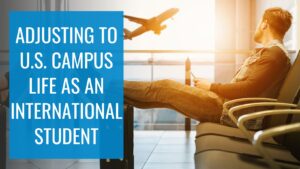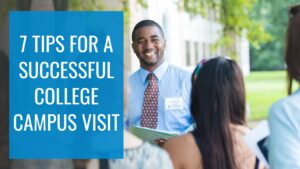With the opportunity to visit a college campus, deciding who to meet with and why is the first hurdle. Depending on one’s needs, who to meet with can range from the typically seen admissions representative, to an athletics coach, to a professor.
Although visitors tend to frequent college campuses during the summer due to availability of time and flexibility with travel, when school is not in session or bustling with students, staff and faculty typically remain on campus throughout the year. Also, some current students remain on campus to provide campus tours and to meet with prospective applicants and students. Beyond the normal information session and campus tour with an admissions representative or current student, prospective applicants and students may have the option to schedule a meeting with a financial aid representative, a faculty member, athletics coaches, other current students, or alumni. In addition, it is not uncommon for admissions representatives to have also attended the institution they represent. Thus you can hit two birds with one stone, so to speak.

Visitors will need to set up their own college visit by either signing up online for the available resources or making an individual request. Below are several options in considering who to meet with when visiting a college campus.
Admissions & Financial Aid Representatives/Officers
Admissions representatives are the first and usual suspects when arranging a college visit, as their offices typically organize information sessions and campus tours. In addition to these events, individual meetings are sometimes available either via a walk-in appointment with the admissions officer on-call or by scheduling ahead of time.
If you schedule in advance, you may be able to meet with “your” admissions officer during your visit. Admissions officers are commonly divided regionally to evaluate applicants from specific regions. A simple search on the department site will determine who is “your” admissions officer to schedule a meeting with. Regardless, a one-on-one meeting with any member of the admissions staff is ideal if several questions remain after the information session or campus tour.
Although admissions officers may be able to answer many financial aid questions, if specific questions arise, schedule to meet with a financial aid officer, who can address any and all institutional financial questions in detail.
Current Students/Student Staff/Tour Guides
Student life is an important aspect of any college or university. Meeting with a current student can help answer some of those non-academic questions about the college or university and campus life. Although no one student is representative of the entire student population, they are an indication of what kind of students the school attracts and are able to provide direct commentary on what the school is really like.
Not many undergraduate students linger on campus over the summer, but it is not uncommon for some to remain and even work or volunteer in the admissions office for the purpose of meeting with prospective applicants and students and providing campus tours. There is normally time during or after a campus tour to ask them questions, but individual meetings can sometimes be arranged as well. Some students may even be comfortable with providing their contact information.
Student tour guides only offer specific kinds of information, so be sure to ask questions about what is not included on the campus tour for deeper information.
Faculty/Professors/Academic Departmental Heads
In some instances, prospective applicants and students have the option to arrange a meeting with a professor. These meetings take the campus visit a step further and need to be arranged ahead of time. Visitors also sometimes have the option to sit in on a class. To meet one-on-one with a faculty member, reach out directly to the department, but attending a class session can usually be arranged through the admissions office.
Meeting with faculty or academic departmental heads by attending a class or meeting individually provides an excellent snapshot into an area of academic interest and can be a rarely taken opportunity. The insight provided can help solidify a major or an area-of-study interest or clearly rule out others. If an in-person meeting is not possible, reach out online or via email and present questions there. This may result in a virtual or in-person meeting at another date.
Moreover, after having met with a professor, applicants will be better able to articulate why a major has been chosen. Meeting with a professor is a solid marker of demonstrated interest in a school and area of study as well. Applicants who have taken this extra step have clearly thought deeply about their college options, the school, and the major, which are compelling factors for admissions staff when evaluating applications.
Athletics Coaches & Current Student-Athletes
If considering playing a sport in college, meeting with a coach and/or a current student-athlete can help determine fit and the possibility of participation. Such meetings need to be scheduled in advance and can be completed either through the athletic department or the admissions office.
A sense of the team culture, the coach/es, and facilities can influence where or if one is interested in participating in college athletics. Team coaches will be able to provide information on team space or the ability to actively recruit. Student-athletes are less likely to be on campus during the summer, but at the very least, if athletics are a point of interest, be sure to visit the facilities.
Alumni
Alumni can provide a unique perspective on the college search process. In addition to having been through the admissions process and having attended the school, alumni can also speak directly to educational outcomes. If they majored in a particular area of interest to you, the better; but in any case, alumni will be able to articulate the role their major played in kickstarting their chosen career.
Prospective applicants and students are most likely to meet alumni during a college admission interview, but sometimes too during a campus visit, as “alumni-admission officers” often seek to continue a relationship with their alma mater as graduates.
In Conclusion
A college visit is a time to get a sense of the campus and community. While an information session and a campus tour are the most important components, make the most of your time on campus by digging deeper to experience more and familiarize yourself with a potential school. Talk to key individuals and more.
Unless a college or university tracks demonstrated interest, campus visits and meetings are strictly for personal information. Ask questions and discover what is the right fit. Personalizing the campus visit beyond attending the typical information session and campus tour can help define the college search experience.
If you’d like assistance with your application, we’d love to help! Contact us today!

All of our blog posts are written by Former College Admission Officers who serve as members of our admission consultant team.



